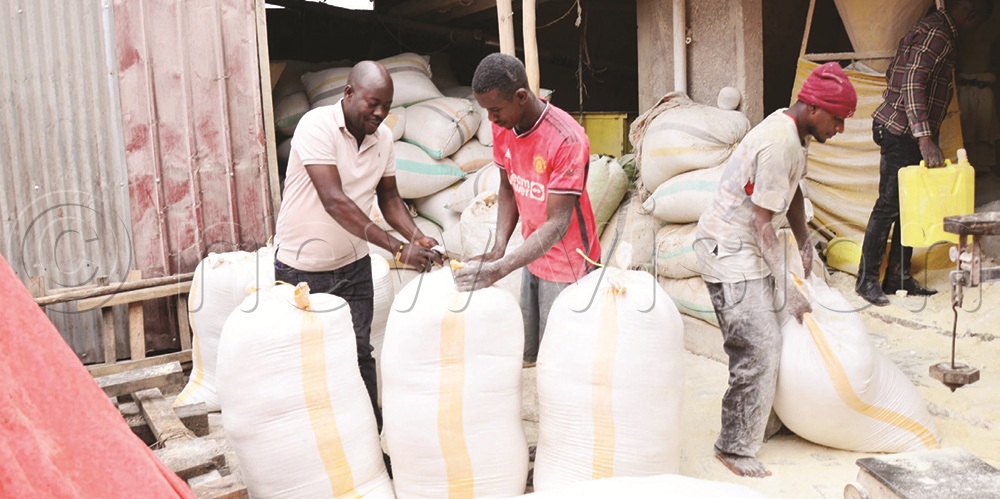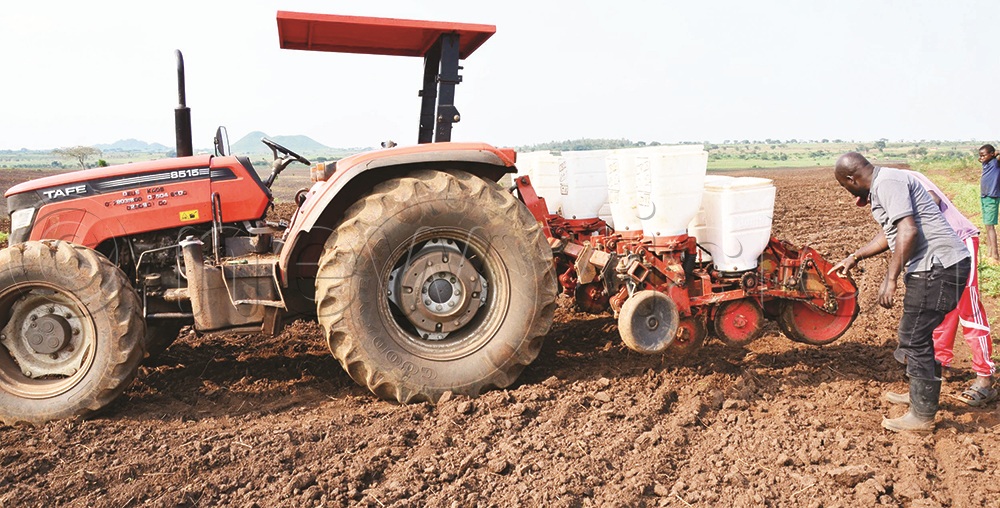Inside Bwengye’s multi-product agro empire
A primary school dropout from Kayonza village, Lwengo district, he once pedalled through Masaka’s backstreets on a bicycle, selling produce door-to-door.
Bwengye at the maize milling section inside the factory. (Photos by Umar Nsubuga)
________________
For the tenth year running, Vision Group, together with the Embassy of the Netherlands, KLM Airlines, dfcu Bank and Koudjis Animal Nutrition is running the Best Farmers Competition. The 2025 competition runs from April to November, with the awards in December. Every week, Vision Group platforms will publish profiles of the farmers. Winners will walk away with sh150m and a fully paid-for trip to the Netherlands.
A few agricultural entrepreneurs in Kiryandongo and Masaka districts have built an empire as far-reaching and impactful as David Bwengye’s.
From the 1,280 acres of maize and soya beans he manages in Panyadoli A, Kiryandongo, to his 210-acre farm in Kitume, Masaka, where coffee and maize thrive, his footprint in farming is impressive.
These farms supply Bwengye Millers Limited, his milling facility in Kasubi, Kampala, where rice, maize flour, soya beans flour and maize bran are processed for domestic markets and exported to Rwanda, South Sudan, and the Democratic Republic of Congo.
Yet Bwengye’s story began far from lorries and factories. A primary school dropout from Kayonza village, Lwengo district, he once pedalled through Masaka’s backstreets on a bicycle, selling produce door-to-door.
Humble beginnings
Born 46 years ago and raised by his mother, Peace Kakikomera, Bwengye left school after Primary Seven due to lack of fees.

Bwengye and his workers packing maize bran.
At just 13, he began cultivating maize, beans, cassava, and groundnuts on a two-acre plot. He kept reinvesting every coin, while learning about discipline and budgeting through necessity. In the early 1990s, he moved to Masaka’s trading centre, selling produce door-to-door on a bicycle.
His honesty and reliability earned him loyal customers. Recognising that farming alone could not accelerate his progress, he saved from bicycle sales, rented five acres in Kayonza in 1995, and planted cassava, a crop he saw as both reliable and profitable.
He earned sh2m from that first harvest, which was his turning point and fuelled his journey toward Kampala with a dream of scaling up his business.
Scaling up
He lived briefly with his brother in Bweyogerere, who advised him on the best location.
Bwengye settled in Kasubi, a bustling hub for small-scale trade in Kampala. Within a short time, he upgraded from a bicycle to a motorcycle, sourcing produce directly from farmers in Hoima, Mubende and Masaka districts.
Thus, he cut out middlemen, while strengthening his networks and reputation. In 1997, he founded Bwengye Millers Limited, in Kasubi, with the first produce he dealt with being maize and beans, later expanding into rice and soya beans.
His mother oversaw cassava and groundnut projects in Masaka, ensuring a steady supply. “People trusted me before I had money. That trust was my capital,” he says.
Retail and reputation
By 2012, he opened his first retail shop in Kasubi. His edge? He was both producer and supplier, controlling quality from farm to shelf.
Reinvesting profits allowed him to expand landholdings and scale operations. Today, he’s regarded as a trusted source of quality produce.
Maize farming as science
Bwengye grows maize on 900 acres in Kiryandongo district.
He says over the years, he has learnt there is a science he has to apply to get high returns. He uses tractors for land preparation and planting, ensuring uniform spacing and optimal sunlight exposure.
He buys certified seeds at sh8,000 per kilogramme and invests about sh500,000 per acre, preferring organic methods.
Farm worker Martin Apege says: “We use the right machinery, certified seeds, and trained labour. That is why Bwengye’s maize is consistently reliable.”
Harvesting is timed for full dryness to avoid losses during post-harvest handling.
“The quality of seeds and grains at harvest determines market value,” he says.
Soya beans venture
Curiosity led Bwengye to soya beans. After training from the district farmers’ association, he allocated a few acres, which has since expanded to 400 acres.
He processes part of the harvest into flour for local and international markets. Soya beans require attention but are relatively pest-resistant.

Bwengye controls the quality of the entire value chain of his products right from the garden up to processing and packaging.
One acre needs about 20kg of seed, costing roughly sh6,000 per kilo. With proper management, yields can reach 800kg per acre, making the investment of sh600,000 per acre highly rewarding.
Best agronomic practices
Bwengye’s agronomic practices are consistent across his farms. Mechanised land preparation and planting ensure precision.
He prioritises certified seeds and organic methods. Sunlight, often overlooked, is central to his strategy. He advises farmers to consider the positioning of their gardens and the time of planting.
“Maize thrives with adequate sunlight, so timing and spacing are key to ensure quality,” he says.
Embracing value addition
President Museveni’s call for “value addition” has become Bwengye’s guiding philosophy.
In 2020, he invested $68,000 (about sh235m) in a modern rice milling plant that sorts rice into four grades. The impact was immediate — higher quality output and broader market reach. The initial investment depleted most of his savings, prompting him to seek support through the Agricultural Credit Facility under the Bank of Uganda.
With the loan, he expanded operations. Today, his factory is valued at over sh2b and stands as a beacon of agro-industrialisation.
Bwengye Millers Limited now runs multiple product lines: rice, maize flour, soybean flour, and maize bran. Three trailers distribute the products across Uganda, while trucks from Rwanda, South Sudan, and the Democratic Republic of Congo load directly from the premises.
Inside, operations are tight and professional. Ten permanent staff and over 15 casual workers keep the factory running smoothly.
A spacious warehouse stores raw materials and finished goods in a controlled environment.
Buying local, building trust
The company only buys rice with a moisture content of 14%, ensuring grains are properly dried and clean.
“We grade rice into four categories and pay cash on delivery. Farmers benefit immediately,” Bwengye says.
To ensure consistency, the company sources rice in bulk from farmer groups and co-operatives. Warehousing helps manage supply year-round.
Challenges
His 1,280-acre farm in Kiryandongo employs over 100 people and serves as a training ground for local farmers.
However, poor infrastructure remains a major challenge. Roads are often impassable during rains, driving up transport costs and reducing efficiency.
Looking ahead
Bwengye envisions expanding his farm and factory into a regional milling powerhouse.
“I want to create more jobs, introduce modern technology and provide daily meals for 100 workers,” he says.
He plans to study advanced milling abroad and invest in cassava processing machines, tractors and irrigation systems.
Mistakes, lessons learned
“I made plenty of mistakes along the way,” Bwengye admits.
“In the early days, I under-estimated the cost of inputs and over-estimated my sales, which sometimes left me short of cash. I also trusted buyers too easily, and a few deals went wrong.”
From these mistakes, Bwengye says he learnt the value of discipline, careful planning and the importance of saving for emergencies.
He also diversified his enterprises to cushion his business in case of losses in one or more.
“Most importantly, I realised that patience, persistence and learning from every mistake are what turn challenges into stepping stones for long-term success.”
Regarding how to run his enterprise professionally, he says he never received any training, but has learnt on the job as well as from observing successful farmers around him.
Community impact
Bwengye has mentored more than 500 farmers across Kiryandongo and Masaka districts, sharing practical skills in modern farming, value addition and business management.
His guidance has empowered many to increase yields, start small processing ventures and improve household incomes. Youth trained under his mentorship have gone on to establish their own agribusinesses, creating jobs in their communities.